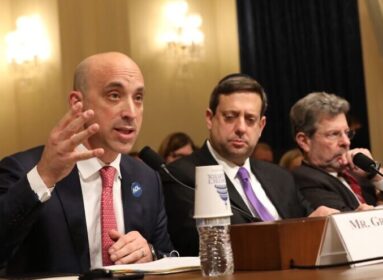
Summer is the perfect time to take a relaxing break from the great big (sometimes burdensome) world and lose yourself in a good book. What to read? We checked out the Jewish Book Council at www.jewishbookcouncil.org – and came away with an enticing list of books with Jewish content or Jewish themes that were published in 2017/2018. So, pull up a beach chair, pop open the beach umbrella…and start reading.
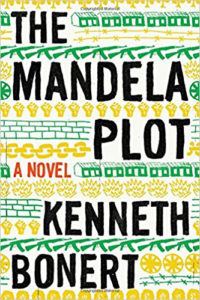 The Mandela Plot
The Mandela Plot
By Kenneth Bonert
As the 1980s draw to a close, South Africa is a maelstrom of political violence with the apartheid regime in its death throes. Young Martin Helger is the struggling odd duck at an elite private boys school in Johannesburg, with his father a rough-handed scrap dealer and his brother a mysterious legend. When a beautiful and manipulative American arrives at the family home, Martin soon finds himself thrust into the heart of the struggle. At the same time, secrets from the past begin to emerge and old sins long buried return in terrifying new ways, tearing at the Helgers, a second-generation Jewish family, even as the larger forces of history and politics tear apart the country as a whole. Ultimately Martin must rely on alternative strengths to protect himself and fight for a better future.
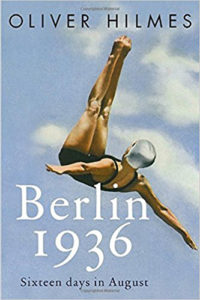 Berlin 1936: Sixteen Days in August
Berlin 1936: Sixteen Days in August
By Oliver Hilmes; translated by Jefferson Chase
Berlin 1936 takes the reader through the 16 days of the Olympiad, describing the events in the German capital through the eyes of a select cast of characters – Nazi leaders and foreign diplomats, sportsmen and journalists, writers and socialites, nightclub owners and jazz musicians. While the events in the Olympic stadium, such as when an American tourist breaks through the security and manages to kiss Hitler, provide the focus and much of the drama, it also considers the lives of ordinary Berliners – the woman with a dark secret who steps in front of a train, the transsexual waiting for the Gestapo’s knock on the door, and the Jewish boy fearing for his future and hoping that Germany loses on the playing field. Berlin 1936 offers a last glimpse of the vibrant and diverse life in the German capital in the 1920s and ‘30s that the Nazis wanted to destroy.
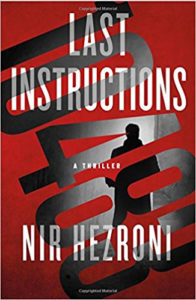 Last Instructions: A Thriller (Agent 10483)
Last Instructions: A Thriller (Agent 10483)
By Nir Hezroni
The sequel to Three Envelopes, the critically-acclaimed Mossad thriller by Nir Hezroni, continues the story of Agent 10483, a former Israeli secret service operative. Now, Agent 10283, a psychopathic former Israeli spy, is busy trying to shut down the spy organization he once worked for and plotting his revenge against the key individuals whom he deems responsible for the Organization’s betrayal against him. Now, he’s traveling the world in a quest to find a hidden nuclear warhead to use against them.
Everyone wants to get their hands on Agent 10483 – the two teams from the Organization; twin assassins who are working in the service of Herr Schmidt, an intelligence organization unto himself who also wants the warhead; and Carmit, a sub-contractor for the Organization who performed transformations on him to manipulate his behavior during the course of his assassination missions abroad. A fascinating behind-the-scenes glimpse into the technology of high-level intelligence operations.
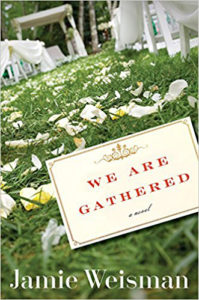 We Are Gathered: A Novel
We Are Gathered: A Novel
By Jamie Weisman
One afternoon in Atlanta, Georgia. Two people heading to the altar. One hundred fifty guests. The bride, Elizabeth Gottlieb, a member of Atlanta’s wealthy Jewish elite. The groom, Hank Jackson, not a member. Not a Jew. The couple, however, is beside the point, because We Are Gathered belongs to the guests. Among them, Carla, Elizabeth’s quick-witted, ugly duckling childhood best friend turned Hollywood film scout, whose jaundiced view of the drama that is an American wedding provides a lens of humor and its corollary, deep compassion for the supporting actors who steal the show; Elizabeth’s great-aunt Rachel, a Holocaust survivor from Germany who is still navigating a no-man’s-land between cultures and identities; Elizabeth’s wheelchair-bound grandfather Albert, who considers his legacy as a man, both in the boardroom and the bedroom; and Annette, the mother of the bride herself, reminded now of her youthful indiscretions in love and motherhood.
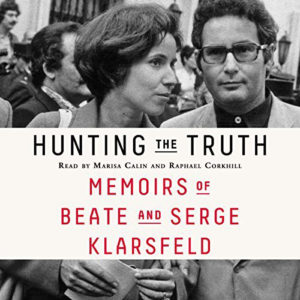 Hunting the Truth: Memoirs of Beate and Serge Klarsfeld
Hunting the Truth: Memoirs of Beate and Serge Klarsfeld
By Beate and Serge Klarsfeld; translated by Same Taylor
They were born on opposite sides of the Second World War: Beate grew up in the ruins of a defeated Weimar Germany, while Serge, a Jewish boy in France, was hiding in a cupboard when his father was arrested and sent to Auschwitz. They met on the Paris Métro and fell in love, and became famous when Beate slapped the face of the West German chancellor ― a former Nazi ― Kurt Georg Kiesinger. For the past half century, Beate and Serge Klarsfeld have hunted, confronted, prosecuted, and exposed Nazi war criminals all over the world. They have been sent to prison for their beliefs and have risked their lives protesting antisemitism behind the Iron Curtain in South America and in the Middle East. They have received honors from presidents and letter bombs from neo-Nazis. They have fought relentlessly not only for the memory of Holocaust victims but also for modern-day victims of genocide and discrimination. And they have done it all while raising a family.
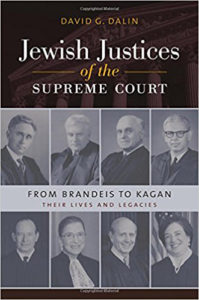 Jewish Justices of the Supreme Court, from Brandeis to Kagan
Jewish Justices of the Supreme Court, from Brandeis to Kagan
By David G. Dalin
Jewish Justices of the Supreme Court examines the lives, legal careers, and legacies of the eight Jews who have served or who currently serve as justices of the U.S. Supreme Court: Louis D. Brandeis, Benjamin Cardozo, Felix Frankfurter, Arthur Goldberg, Abe Fortas, Ruth Bader Ginsburg, Stephen G. Breyer, and Elena Kagan.
David Dalin discusses their relationships with the presidents who appointed them, and given their Jewish background, investigates the antisemitism some of the justices encountered in their ascent within the legal profession, as well as the role that antisemitism played in the attendant political debates and Senate confirmation battles. Other topics and themes include the changing role of Jews within the American legal profession and the views and judicial opinions of each of the justices on a variety of issues.
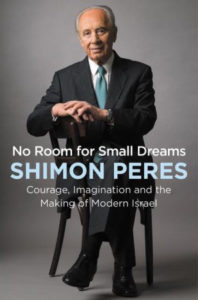 No Room for Small Dreams: Courage, Imagination, and the Making of Modern Israel
No Room for Small Dreams: Courage, Imagination, and the Making of Modern Israel
By Shimon Peres
In 1934, 11-year-old Shimon Peres emigrated to the land of Israel from his native Poland, leaving behind an extended family who would later be murdered in the Holocaust. Peres would indeed go on to serve the new state as prime minister, president, foreign minister, and the head of several other ministries. He was central to the establishment of the Israel Defense Forces and the defense industry that would provide the young state with a robust deterrent power. He was crucial to launching Israel’s nuclear energy program and to the creation of its high-tech “Start-up Nation” revolution. He prompted some of the most daring military operations in history, among them the legendary Operation Entebbe. His stunning transition from hawk to dove made him one of the globe’s most honored and admired statesmen. In this, his final work, finished only weeks before his passing, Peres offers an honest examination of the crucial turning points in Israeli history through the prism of having been a decision maker and eyewitness.
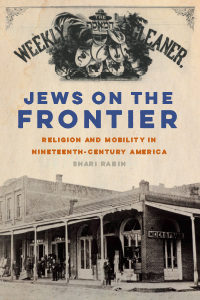 Jews on the Frontier: Religion and Mobility in Nineteenth-Century America
Jews on the Frontier: Religion and Mobility in Nineteenth-Century America
By Shari Rabin
Shari Rabin recounts the journey of Jewish people as they left Eastern cities and ventured into the American West and South during the 19th century. It brings to life the successes and obstacles of these travels, from the unprecedented economic opportunities to the anonymity and loneliness that complicated the many legal obligations of traditional Jewish life. Where could one procure kosher meat? How could one find nine co-religionists for a minyan (prayer quorum)? Rabin argues that Jewish mobility during this time was pivotal to the development of American Judaism. In the absence of key institutions like synagogues or charitable organizations which had played such a pivotal role in assimilating East Coast immigrants, ordinary Jews on the frontier created religious life from scratch, expanding and transforming Jewish thought and practice.
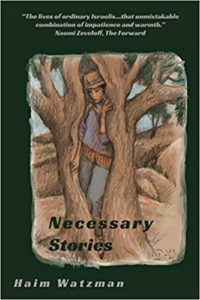 Necessary Stories
Necessary Stories
By Haim Watzman
Twenty-four stories of Israeli and Jewish life, chosen from the more than 100 Haim Watzman has written over the last nine years in his “Necessary Stories” column in The Jerusalem Report. Bookended by a flashback to his first weekend in Israel 40 years ago and a storytelling encounter on a recent flight back home from the US, these stories – funny, meditative, and sad, set in immigrant camps, the army, and the author’s own neighborhood in south Jerusalem – uniquely capture what it is like, in our age, to be an Israeli and a Jew.
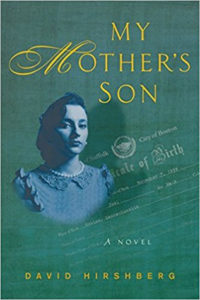 My Mother’s Son: A Novel
My Mother’s Son: A Novel
By David Hirshberg
My Mother’s Son is a story told by a radio raconteur revisiting his past in post-World War II Boston, the playground and battleground for two brothers whose lives are transformed by discoveries they never could have imagined. From the opening line of the book, “When you’re a kid, they don’t always tell you the truth,” the stage is set for this riveting coming-of-age story that plays out against the backdrop of the Korean War, the aftermath of the Holocaust, the polio epidemic, the relocation of a baseball team, and the shenanigans of politicians and businessmen. Hirshberg weaves together events, characters, and clues and creates a rich tapestry of betrayal, persecution, death, loyalty, and unconditional love that resonates with today’s America.
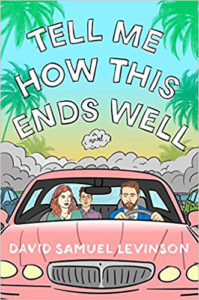 Tell Me How This Ends Well
Tell Me How This Ends Well
By David Samuel Levinson
In 2022, American Jews face an increasingly unsafe and antisemitic landscape at home. Against this backdrop, the Jacobson family gathers for Passover in Los Angeles. But their immediate problems are more personal than political, with the three adult children, Mo, Edith, and Jacob, in various states of crisis, the result, each claims, of a lifetime of mistreatment by their father, Julian. The siblings have begun to suspect that Julian is hastening their mother Roz’s demise, and years of resentment boil over as they debate whether to go through with the real reason for their reunion: an ill-considered plot to end their father’s iron rule for good. That is, if they can put their bickering, grudges, festering relationships, and distrust of one another aside long enough to act. And God help them if their mother finds out.
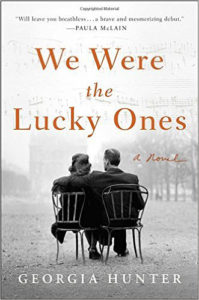 We Were the Lucky Ones
We Were the Lucky Ones
By Georgia Hunter
It is the spring of 1939 and three generations of the Kurc family are doing their best to live normal lives, even as the shadow of war grows closer. The talk around the family Seder table is of new babies and budding romance, not of the increasing hardships threatening Jews in their hometown of Radom, Poland. But soon the horrors overtaking Europe will become inescapable and the Kurcs will be flung to the far corners of the world, each desperately trying to navigate his or her own path to safety. Driven by an unwavering will to survive and by the fear that they may never see one another again, the Kurcs must rely on hope, ingenuity, and inner strength to persevere.
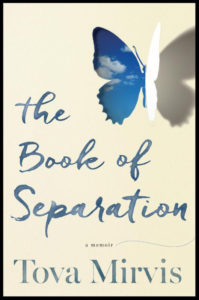 The Book of Separation
The Book of Separation
By Tova Mirvis
Born and raised in a tight-knit Orthodox Jewish family, Tova Mirvis committed herself to observing the rules and rituals prescribed by this way of life. She married a man from within the fold and quickly began a family. But over the years, her doubts became noisier than her faith, and at age forty she decided to leave her husband and her faith. She strikes out on her own to discover what she does believe and who she really is. This will mean forging a new way of life not just for herself, but for her children, who are struggling with what the divorce and her new status as “not Orthodox” mean for them. Tova takes us through her first year outside her marriage and community as she learns to silence her fears and seek her own path to happiness.
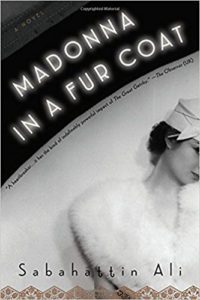 Madonna in a Fur Coat
Madonna in a Fur Coat
By Sabahattin Ali; translated by Maureen Freely & Alexander Dawe
A shy young man leaves his home in rural Turkey to learn a trade and discover life in 1920s Berlin. There, amidst the city’s bustling streets, elegant museums, passionate politics, and infamous cabarets, a chance meeting with a beautiful half-Jewish artist transforms him forever. Caught between his desire for freedom from tradition and his yearning to belong, he struggles to hold on to the new life he has found with the woman he loves.
First published in 1943, this novel, with its quiet yet insistent defiance of social norms, has been topping best-seller lists in Turkey since 2013.
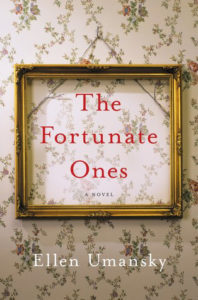 The Fortunate Ones
The Fortunate Ones
By Ellen Umansky
It is 1939 in Vienna, and Rose Zimmer’s parents are desperate. Unable to get out of Austria, they send their young daughter on a kindertransport to live with strangers in England. Six years later, the war over, a grief-stricken Rose searches for one piece of her childhood: the Chaim Soutine painting her mother had cherished. Many years later, the painting finds its way to America. In modern-day Los Angeles, Lizzie Goldstein has returned home for her father’s funeral. Newly single and unsure of her path, she also carries a burden of guilt that cannot be displaced. Years ago, as a teenager, Lizzie threw a party at her father’s house with unexpected consequences. The Soutine painting that she loved and had provided lasting comfort to her after her own mother had died was stolen, and has never been recovered. This painting will bring Lizzie and Rose together and ignite an unexpected friendship, eventually revealing long-held secrets that hold painful truths.
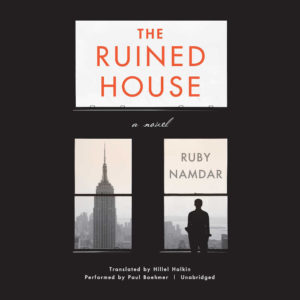 The Ruined House
The Ruined House
By Ruby Namdar; translated by Hillel Halkin
Andrew P. Cohen, a professor of comparative culture at New York University, is at the zenith of his life. Adored by his classes and published in prestigious literary magazines, he is about to receive a coveted promotion –the crowning achievement of an enviable career. He is on excellent terms with Linda, his ex-wife, and his two grown children admire and adore him. His girlfriend, Ann Lee, a former student half his age, offers lively companionship. A man of elevated taste, education, and culture, he is a model of urbanity and success. But the manicured surface of his world begins to crack when he is visited by a series of strange and inexplicable visions involving an ancient religious ritual that will upend his comfortable life. The Ruined House unfolds over the course of one year, as Andrew’s world unravels and he is forced to question all his beliefs.
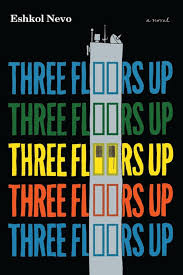 Three Floors Up
Three Floors Up
By Eshkol Nevo; translated by Sondra Silverston
On the first floor, Arnon, a tormented retired officer who fought in the First Intifada, confesses to an army friend with a troubled military past how his obsession about his young daughter’s safety led him to lose control and put his marriage in peril. Above Arnon lives Hani, known as “the widow,” whose husband travels the world for his lucrative job while she stays at home with their two children, increasingly isolated and unstable. On the top floor lives a former judge, Devora. Eager to start a new life in her retirement, Devora joins a social movement, desperately tries to reconnect with her estranged son, and falls in love with a man who isn’t what he seems.
 If All the Seas Were Ink
If All the Seas Were Ink
By Ilana Kurshan
At the age of 27, alone in Jerusalem in the wake of a painful divorce, Ilana Kurshan joined the world’s largest book club, learning daf yomi, Hebrew for “daily page” of the Talmud, a book of rabbinic teachings spanning about 600 years and the basis for all codes of Jewish law. A runner, a reader and a romantic, Kurshan adapted to its pace, attuned her ear to its poetry, and discovered her passions in its pages. She brought the Talmud with her wherever she went. By the time she completed the Talmud after seven and a half years, Kurshan was remarried with three children.
This memoir is a tale of heartache and humor, of marriage and motherhood, and of learning to put one foot in front of the other by turning page after page. Kurshan takes us on a deeply accessible and personal guided tour of the Talmud, shedding new light on its stories and offering insights into its arguments.
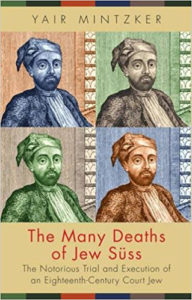 The Many Deaths of Jew Suss
The Many Deaths of Jew Suss
By Yair Mintzker
Joseph Süss Oppenheimer – “Jew Süss” – is one of the most iconic figures in the history of antisemitism. In 1733, Oppenheimer became the “court Jew” of Carl Alexander, the duke of the German state of Württemberg. When Carl Alexander died unexpectedly, the Württemberg authorities arrested Oppenheimer, put him on trial, and condemned him to death for unspecified “misdeeds.” He was hanged on Feb. 4, 1738. He is most often remembered today through several works of fiction, chief among them a vicious Nazi propaganda movie made in 1940 at the behest of Joseph Goebbels.
The Many Deaths of Jew Süss is a compelling new account of Oppenheimer’s notorious trial. Drawing on a wealth of rare archival evidence, Yair Mintzker investigates conflicting versions of Oppenheimer’s life and death. What emerges is a lurid tale of greed, sex, violence, and disgrace. Meticulously reconstructing the social world in which they lived, Mintzker conjures an unforgettable picture of “Jew Süss” in his final days that is at once moving, disturbing, and profound.







 Southern New England Jewish Ledger
Southern New England Jewish Ledger
